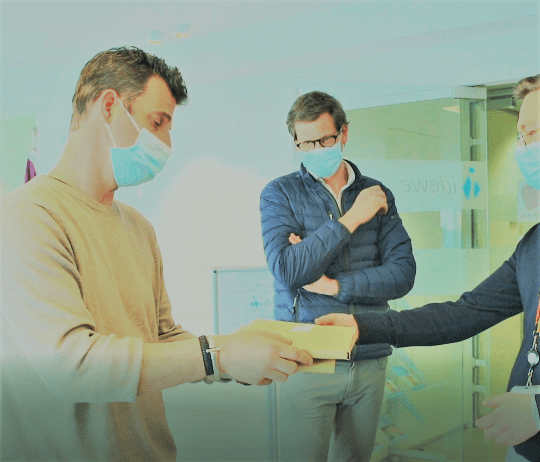The Belgian trade association for events organisation (Febelux) and the collective #restartMICE have presented a report on how infection risks at events during the coronavirus crisis can be estimated and managed to allow the reopening of the sector.
The report in three languages (An Operational Guide: Efficient Tools & Practical Solutions) was presented at a press conference at Press Club Brussels and immediately afterwards handed over to Frank Vandenbroucke, minister of health and social affairs, as well as to Alexander De Croo, Belgian prime-minister since 1 October 2020.
The event and meeting sector in Belgium, including MICE (Meetings, Incentives, Conventions, Events), represents 3,000 companies with 88,000 employees. Annually, close to 80,000 events of all kinds are organised–cultural events, local festivals, congresses and seminars. In particular Brussels, with its several European and international institutions, is a leading event destination in the world.
The impact of the event sector on the economy, however, is much wider since the hospitality sector (restaurants, bars, and hotels) and the transport sector benefit from the events. But being considered a non-essential sector, most of the events have been cancelled since March 2020 and the event sector was one of the hardest-hit sectors in Belgium with reported losses in turnover of 60 – 80 % in 2020.
Related News
- Event sector pitches De Croo on reopening with special measures
- Top restaurants take legal action against the government
- Hospitality sector calls for certainty about 1 May reopening
For almost a year, experts from #restartMICE have been working on new measures and solutions that could allow the resumption of activities in a safe way. The work has resulted in a detailed report, scientifically supported by Dr Biéva, published already in September 2020 and re-edited in March 2021 with a specific study on the aerosol risk with the support of Dr Christophe Cloquet.
They have developed a kind of toolbox, including a calculator, which estimates the risk of transmission of COVID-19 via droplets and aerosols in crowded spaces. The risk depends on a number of parameters such as type of event, room properties, number of participants, speaking volume, and safety measures imposed on the participants. Another factor is the pandemic situation where the event takes place.
According to the report, the risks can be estimated and controlled, which would make events safer than going to the supermarket or travelling by bus.
A perspective for the event sector
“Our aim is not to organize business events as of next week, or event next month, but to have a perspective and plan for the restart of such events,” the organisers explained.
Christophe Samyn, a safety and security expert for MICE, told The Brussels Times that the risk management model in the report is a first step and that the event sector would need permission to go ahead with pilot events. “A live test is the second step and it would be very useful to compare the theoretical and operational results. We are currently analysing the data collected during the press conference, to have ‘live event’ figures.”
“Our methodology aims at reassuring the authorities that our sector understands and can evaluate the risk level, and has operational solutions to manage this risk. The operational report and the scientific calculator can be downloaded and used by anyone, any team, any official health service, free of charge and on-line, and could be the key to decide on allowing events to take place.”
Are you in favour of vaccination passports or certificates to allow people to attend events?
”This is a difficult ethical question,” Christophe replied. « Of course, being in a position of having zero risk is the best option. The problem is that people don’t have a say on how governments are managing the vaccination process and we see it in Belgium. How long time will it take to vaccinate a sufficient number of persons in the EU?”
“In a risk management scenario, it’s mandatory to take into account reality and reality today is that we are far away from having a realistic plan for the vaccination rollout. We don’t even know for how long time the vaccine is effective. Should we have to wait until zero risk to resume economic activities in society or should we rather learn how to restart them in the safest way possible”?
Despite subsidies to companies and short-term unemployment aid to employees, Christophe Samyn is critical against the government for its support to the event sector during the crisis. The allocation of financial support is inconsistent and depends on region, he says.
“We are all conscious that we are in a crisis situation and that every economic sector has to accept losses. But the situation differs by sector and our sector is facing a bleak future if events aren’t allowed to be reopened soon in a safe way as we are proposing. The grants paid to our companies hardly cover their fixed costs and owners are obliged to use their personal money to keep them alive.”
He warns that more than 50% of the sector will disappear in the coming months and years if no effective solutions are found. “Companies that have existed for 30 years are now at the edge of the cliff. They have used bank support to fill the financial hole and are still in the same precarious position. It’s time for the government to listen to us. We are there to help and to work with the government experts.”
M. Apelblat
The Brussels Times

